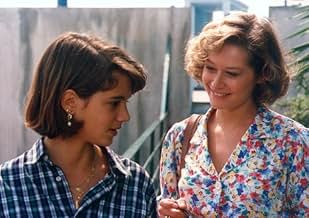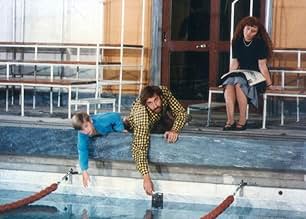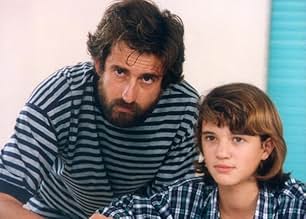VALUTAZIONE IMDb
7,1/10
3281
LA TUA VALUTAZIONE
Durante una partita di pallanuoto, Michele, funzionario del PCI colto da amnesia, rimette insieme i pezzi della propria vita e discute sul disagio, la confusione, le contraddizioni della sin... Leggi tuttoDurante una partita di pallanuoto, Michele, funzionario del PCI colto da amnesia, rimette insieme i pezzi della propria vita e discute sul disagio, la confusione, le contraddizioni della sinistra.Durante una partita di pallanuoto, Michele, funzionario del PCI colto da amnesia, rimette insieme i pezzi della propria vita e discute sul disagio, la confusione, le contraddizioni della sinistra.
- Premi
- 6 vittorie e 15 candidature totali
Recensioni in evidenza
Michele is the leader of the Italian communist party and a professional water polo player. On this day he has just lost his memory following a (very stupid) car accident. So he has to discover the intricacies of his life again, and he does so through the naive eyes of the anxious child he used to be - through an improvised psychoanalytic trip symbolized by the friendships and adversities of a water polo game.
While she may not be the star, I appreciate that Asia Argento had a part here. I always felt like she was not really in much beyond her father's films or the films of her father's friends, at least at first. But this is a clear exception, because there is nothing about this movie that says Dario Argento was involved.
While she may not be the star, I appreciate that Asia Argento had a part here. I always felt like she was not really in much beyond her father's films or the films of her father's friends, at least at first. But this is a clear exception, because there is nothing about this movie that says Dario Argento was involved.
If you are Italian and old enough to have lived there in the 70s/80s, then you will probably get the point of this movie: Moretti's conflictual relationship with the (then) Italian Communist Party. But that doesn't change the fact that the film is weird and delirious.
If your clique is the intellectual/radical/snobbish kind, you'll have to say that the movie is superb.
If none of the above applies, then pick another film.
If your clique is the intellectual/radical/snobbish kind, you'll have to say that the movie is superb.
If none of the above applies, then pick another film.
As cinema "Palombella rossa" is quite bad, probably Nanni Moretti's worst film, and curiously made after "La messa è finita", in which faith was put to test. In "Palombella..." it was the turn to reflect on one sector of the tense fabric of Italian politics of late 20th century: the Italian Communist Party. Maybe today it results interesting from a historical perspective, as it probably was in 1989 from an ideological point of view to both Italian Communists and those who cared about their predicaments after the Berlin Wall fell. Unfortunately, endlessly enunciated ideas do not make an attractive audiovisual experience, even if the plot device of resorting to the loss of memory is a fine and clever excuse to trigger personal evaluation. Moretti relies more on words than on moving images and sounds, and in the end his film becomes very tedious. You may enjoy it if you love to hear him shouting for 89 minutes, and if you share his ideology (whatever it is): this reminds me of a few of my theater friends who enjoy some tiresome, stage-bound motion pictures that are loaded with dialogues and heavy theatricality. But the average spectator, even the one who loves "films of / with ideas", will probably look in another direction after 20 minutes.
This film is deeply enmeshed in the political culture of Italy, and, in particular, in the culture and politics of that party once known as the Italian Communist Party (PCI). Although you don't need an understanding of this context to enjoy the film, your appreciation of it is certainly enhanced by knowing where Moretti is coming from.
Throughout the film the protagonist, Michele, reiterates a phrase that captures a good deal of the identity of the PCI: `We're the same, but we're different.' The PCI claimed, on the one hand, that it was like any other party: it sought to arrive at power by winning a consensus at the polls and electing its candidates to public office--a party with just as much right as any other (`of equal constitutional dignity') to exercise power within a democratic state. On the other hand, the party said that it was different from all the others because it wanted to use state power in order to bring about a transformation of the existing social and economic order: to build a society in which the exploitativeness, irrationality, all-pervasive commercialism, environmental degradation, and social injustice characteristic of capitalism would be gradually overcome. The party was in the system, but not of the system. This, then, was a party that appealed to the dreams of many idealistic Italians to create a better world to live in (party membership fluctuated between 1.5 and 2 million--and the party saw its percentage of the vote rise in every election for 30 years, cresting in '76 at about 35%).
But as the party got closer to being brought into the government, the tightrope act became more and more tortuous--hence, all of those very contorted "party lines" articulated by Michele in which he attempts to explain why the party should be brought into the government (and why there was nothing to fear from the party), while still holding on to the notion that the party stood for opposition to the existing social order. And that's why another constant refrain in the film is Michele's `I remember': he remembers not only things from his own past, but also a time when the party really seemed to stand for the traditional ideals of the Left.
Now the PCI looks pretty much like any other party, and it no longer even calls itself a party, thus distancing itself from its Marxist-Leninist past: its name today is the unthreatening `Democrats of the Left.' And millions of progressive Italians feel adrift now that they have no party as the repository of their idealism--a sense of desperation expressed beautifully by Michele when he cries out, `Di qualcosa di sinistra' (`Just say something leftist').
By the way, the English title given to the film (`The Red Wood Pigeon') makes absolutely no sense. `Palombella' refers to that shot in water polo we would call a `soft lob' and `rossa' =`red'. So a `palombella rossa' is a `red lob,' symbolizing the kind of soft landing that the PCI sought for its revolutionary program.
Throughout the film the protagonist, Michele, reiterates a phrase that captures a good deal of the identity of the PCI: `We're the same, but we're different.' The PCI claimed, on the one hand, that it was like any other party: it sought to arrive at power by winning a consensus at the polls and electing its candidates to public office--a party with just as much right as any other (`of equal constitutional dignity') to exercise power within a democratic state. On the other hand, the party said that it was different from all the others because it wanted to use state power in order to bring about a transformation of the existing social and economic order: to build a society in which the exploitativeness, irrationality, all-pervasive commercialism, environmental degradation, and social injustice characteristic of capitalism would be gradually overcome. The party was in the system, but not of the system. This, then, was a party that appealed to the dreams of many idealistic Italians to create a better world to live in (party membership fluctuated between 1.5 and 2 million--and the party saw its percentage of the vote rise in every election for 30 years, cresting in '76 at about 35%).
But as the party got closer to being brought into the government, the tightrope act became more and more tortuous--hence, all of those very contorted "party lines" articulated by Michele in which he attempts to explain why the party should be brought into the government (and why there was nothing to fear from the party), while still holding on to the notion that the party stood for opposition to the existing social order. And that's why another constant refrain in the film is Michele's `I remember': he remembers not only things from his own past, but also a time when the party really seemed to stand for the traditional ideals of the Left.
Now the PCI looks pretty much like any other party, and it no longer even calls itself a party, thus distancing itself from its Marxist-Leninist past: its name today is the unthreatening `Democrats of the Left.' And millions of progressive Italians feel adrift now that they have no party as the repository of their idealism--a sense of desperation expressed beautifully by Michele when he cries out, `Di qualcosa di sinistra' (`Just say something leftist').
By the way, the English title given to the film (`The Red Wood Pigeon') makes absolutely no sense. `Palombella' refers to that shot in water polo we would call a `soft lob' and `rossa' =`red'. So a `palombella rossa' is a `red lob,' symbolizing the kind of soft landing that the PCI sought for its revolutionary program.
I consider Red Lob one of the best Italian movies of all times. It's surreal, moving, thought-provoking and incredibly funny. I wonder what a non-Italian audience may make of it, since it's steeped in references of the Italian political environment of the 70s/80s but I hope such audience can enjoy in the same way, I, for example, can love an Aki Kaurismaki movie despite it coming from a culture whose finer points I ignore.
It's a film of my adolescence and nowadays it looks, feels and sounds quaint and almost naive -- but also courageous. Which Italian director would risk today to make a two-hours dream-like, heavily metaphorical political movie? And whose director would manage to make something so hilarious out of it?
I wish I could share at length how much Red Lob influenced me and my whole generation. Some scenes, like the one where Michele slaps the journalist in the face because she is using clichéd expressions, or the one where he tries to explain to a Catholic politician why they are different, are still quoted today and are part of our cultural baggage.
If you've never seen a Moretti movie, maybe start by something more conventional like The Mass is Ended but please don't pass by Red Lob, because it's a real treat.
It's a film of my adolescence and nowadays it looks, feels and sounds quaint and almost naive -- but also courageous. Which Italian director would risk today to make a two-hours dream-like, heavily metaphorical political movie? And whose director would manage to make something so hilarious out of it?
I wish I could share at length how much Red Lob influenced me and my whole generation. Some scenes, like the one where Michele slaps the journalist in the face because she is using clichéd expressions, or the one where he tries to explain to a Catholic politician why they are different, are still quoted today and are part of our cultural baggage.
If you've never seen a Moretti movie, maybe start by something more conventional like The Mass is Ended but please don't pass by Red Lob, because it's a real treat.
Lo sapevi?
- QuizThe meaning of "palombella" in Italian includes "columbine", "wild pigeon", and (in water polo, or in other ball sports) "a parabolic shot to go over the goalkeeper and score a goal"/"a lob shot". So the original title of the film could be read as "Red Lob", which brings the sport and the politics -red obviously signifies the Communist Party- together.
- ConnessioniEdited from La sconfitta (1973)
- Colonne sonoreE ti vengo a cercare
(1988)
Written by Franco Battiato
Performed by various characters
Courtesy of EMI Music Italy Spa
I più visti
Accedi per valutare e creare un elenco di titoli salvati per ottenere consigli personalizzati
- How long is Red Wood Pigeon?Powered by Alexa
Dettagli
Contribuisci a questa pagina
Suggerisci una modifica o aggiungi i contenuti mancanti

























